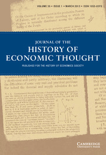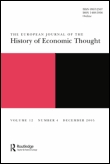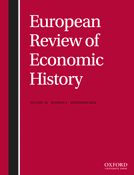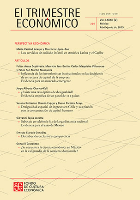
Journal of the History of Economic Thought
Scope & Guideline
Illuminating Historical Perspectives on Economics
Introduction
Aims and Scopes
- Historical Analysis of Economic Theories:
The journal emphasizes the historical development of economic theories, exploring how economic thought has evolved over time and its implications for contemporary economic practices. - Interdisciplinary Approach:
It incorporates perspectives from various disciplines, including sociology, political science, and philosophy, to provide a more comprehensive understanding of economic ideas and their societal impacts. - Focus on Key Economists and Movements:
The journal frequently highlights the contributions of significant economists and economic movements, analyzing their influence on modern economic thought and policy. - Critical Examination of Economic Policies:
It critically examines historical economic policies, their motivations, and outcomes, providing insights into the lessons learned from past economic decisions. - Engagement with Contemporary Issues:
The journal connects historical economic thought with current economic debates, offering a platform for discussions on the relevance of historical ideas in addressing today's economic challenges.
Trending and Emerging
- Intersection of Economics and Gender Studies:
There is a growing trend in exploring the role of gender in economic thought, highlighting women's contributions and the impact of gender on economic policies and theories. - The Role of Economic Thought in Global Development:
Emerging themes focus on the historical impact of economic ideas on global development, particularly in the context of postcolonial studies and the Global South. - Environmental Economics and Ecological Thought:
Recent publications have begun to address the historical evolution of ecological economics, reflecting a rising concern for sustainability and environmental issues in economic discourse. - Reassessment of Neoliberalism and Its Critics:
There is an increasing interest in critically examining neoliberal economic thought, particularly in light of its historical context and its implications for contemporary economic policies. - Narrative and Cultural Approaches to Economic History:
Emerging trends highlight narrative and cultural approaches to economic history, emphasizing the importance of storytelling and cultural context in understanding economic ideas.
Declining or Waning
- Classical Economic Theories:
There has been a noticeable decline in the exploration of classical economic theories from figures like Adam Smith and David Ricardo, as more contemporary frameworks gain attention. - Narrow Focus on Specific Economists:
The journal has shifted away from narrowly focusing on individual economists, such as Keynes or Hayek, in favor of broader movements and interdisciplinary approaches. - Historical Context of Economic Crises:
The frequency of papers addressing historical economic crises has decreased, possibly as newer methodologies and frameworks for analyzing crises become more prevalent. - Reduction in Quantitative Historical Economics:
There is a waning interest in quantitative approaches to historical economic analysis, as qualitative and narrative methods become more favored. - Less Emphasis on Economic History of Non-Western Economies:
The journal has seen a decline in articles focusing on the economic history of non-Western regions, reflecting a potential need for more balanced global perspectives.
Similar Journals

Gospodarka Narodowa-The Polish Journal of Economics
Empowering knowledge through critical economic analysis.Gospodarka Narodowa - The Polish Journal of Economics is a prestigious, peer-reviewed journal dedicated to advancing knowledge in the field of economics. Published by SZKOLA GLOWNA HANDLOWA, KOLEGIUM ANALIZ EKONOMICZNYCH, this journal has been an essential resource since its inception in 2000, providing open access to its valuable research findings to foster academic collaboration and accessibility. With a focus on contemporary economic issues, policies, and trends, the journal serves as a crucial platform for scholars, practitioners, and students alike to explore innovative economic theories and applications, both within Poland and globally. By promoting critical analysis and empirical research, Gospodarka Narodowa contributes significantly to the discourse in economic science, making it a vital resource for anyone interested in this dynamic field.

European Journal of the History of Economic Thought
Unraveling the Historical Tapestry of Economic TheoryThe European Journal of the History of Economic Thought, published by Routledge Journals, Taylor & Francis Ltd, stands as a pivotal platform for scholars in the interdisciplinary fields of economics, history, and philosophy. With its ISSN 0967-2567 and E-ISSN 1469-5936, this esteemed journal is not only recognized for its Q2 ranking in various categories, including Arts and Humanities and Economics, but it also boasts an impressive HIndex indicating a significant level of academic influence and engagement. With published works spanning from 1993 to 2024, this journal seeks to illuminate the historical context and evolution of economic thought, promoting critical discourse among researchers, professionals, and students alike. Although it does not currently offer open access, the journal remains a crucial resource for those wishing to delve into the intricate relationships between economic theory and historical progression. By fostering a deeper understanding of economic ideas and their implications, the European Journal of the History of Economic Thought plays a vital role in enhancing the scholarship within its domain.

Cliometrica
Transforming Historical Data into Economic InsightsCliometrica, published by Springer Heidelberg, is a prestigious journal that has made significant contributions to the fields of Economics and Econometrics as well as History. With an impressive 2023 Scopus ranking placing it in the Q2 category for Economics and Econometrics and the Q1 category for History, this journal stands out as an essential resource for researchers, professionals, and students alike. Known for its rigorous scholarly approach, Cliometrica merges quantitative and qualitative methodologies to uncover insights into historical economic analysis, reflecting the interdisciplinary nature of contemporary research. With access strictly through subscription, it continues to uphold high academic standards, making it a vital addition to any academic library. Published in Germany, Cliometrica serves as a key platform for advancing the discussion and understanding of historical econometric techniques, ensuring its relevance and importance in both historical and economic research circles.

CAMBRIDGE JOURNAL OF ECONOMICS
Transforming Research into Economic ApplicationsCambridge Journal of Economics, published by Oxford University Press, is a premier academic journal in the field of economic theory, policy, and applications, catering to researchers, professionals, and students alike. With a rich history dating back to 1977, this journal has established itself as a notable contributor to critical discourse in the arena of Economics and Econometrics. With an impressive Scopus ranking of #210 out of 716 in its category, placing it in the 70th percentile, the journal maintains a solid Q2 classification, reflecting its significant impact and contribution to the field. Although it operates on a subscription basis, the Cambridge Journal of Economics is accessible through a range of academic databases and libraries, ensuring that its high-quality research reaches a wide audience. The journal aims to advance the understanding and application of economic principles, making it an essential resource for anyone looking to deepen their knowledge or stay updated with the latest research trends in economics.

Journal of the Statistical and Social Inquiry Society of Ireland
Advancing Knowledge Through Empirical Research and DialogueThe Journal of the Statistical and Social Inquiry Society of Ireland, ISSN 0081-4776, is a prominent academic publication that serves as a platform for significant contributions in the fields of economics, sociology, and statistics. Published by the Statistical & Social Inquiry Society of Ireland, this journal aims to foster scholarly dialogue and present empirical research that enriches understanding of social phenomena and statistical methodologies. Although it currently does not provide Open Access options, its collective convergence of research and insight over the years, particularly from 2009 to 2023, reinforces its importance in the academic community. The journal holds a notable position in Scopus rankings, displaying its relevance, albeit within the Q4 quartile for various disciplines, which indicates ample opportunities for emerging researchers to contribute original work. Addressed at the Economic & Social Research Institute in Dublin, this journal invites researchers, professionals, and students alike to explore its rich repository of studies that highlights contemporary issues and enhances interdisciplinary collaboration within Ireland and beyond.

Econ Journal Watch
Navigating the Complexities of Modern Economic Thought.Econ Journal Watch is an esteemed scholarly publication dedicated to advancing the field of economics through critical analysis and discourse. Established by the Institute for Spontaneous Order Economics, this journal aims to provide a platform for researchers, professionals, and students to examine and reflect on contemporary economic issues and theories. With an ISSN of 1933-527X and an E-ISSN of 1933-527X, it has positioned itself within the competitive realm of economics and econometrics. As part of the Q4 category in the 2023 rankings for Economics and Econometrics, the journal is indexed on Scopus, ranking at #569 out of 716 institutions, placing it within the 20th percentile. Although it currently maintains a non-Open Access model, it offers valuable insights and rigorous analysis from 2008 to 2024, contributing significantly to the discourse in economics. The journal’s commitment to fostering a deeper understanding of economic principles makes it an essential resource for anyone engaged in the economic field.

European Review of Economic History
Illuminating the Intersections of Economics and HistoryEuropean Review of Economic History is a premier academic journal published by Oxford University Press, dedicated to advancing the interdisciplinary understanding of economic history from a European perspective. With an impact factor that solidifies its standing in the realm of economics, the journal is distinguished by its Q1 category rankings in both Economics and History for 2023, placing it among the top-tier publications in its field. Established in 1999, it has consistently provided a platform for rigorous research, encompassing empirical studies, theoretical discussions, and insightful case analyses that illuminate the complex interplay between economics and historical development. While the journal operates under a traditional subscription model rather than an open-access framework, it remains integral for scholars and students seeking to deepen their knowledge of economic transitions and policy impacts throughout European history. With its strong reputation reflected in its Scopus rankings, European Review of Economic History plays a vital role in fostering academic discourse and advancing scholarship in this essential area of study.

Iberian Journal of the History of Economic Thought
Charting the Course of Economic Thought in IberiaThe Iberian Journal of the History of Economic Thought, published by Ediciones Complutense, serves as a pivotal platform for the dissemination of scholarly research related to the history of economic ideas in the Iberian context. With its Open Access model established since 2014, this journal aims to enhance visibility and accessibility of research findings, making valuable contributions to the field for researchers, professionals, and students alike. Although currently lacking a quantified impact factor, the journal's dedication to rigorous academic standards ensures that it continues to attract high-quality submissions that reflect contemporary discussions in economic thought. Located in the vibrant academic hub of Madrid, Spain, the journal seeks to explore the rich tapestry of economic theories and practices that have emerged across the Iberian Peninsula, offering a crucial resource for those interested in the historical development of economic concepts and their relevance today. Whether you are seeking to publish your research or delve into the rich archives of past economic theories, the Iberian Journal of the History of Economic Thought stands out as an essential resource in the evolving landscape of economic scholarship.

Journal of Private Enterprise
Connecting Research with Real-World Economic ChallengesJournal of Private Enterprise, ISSN 0890-913X, is a prestigious publication under the auspices of the Association for Private Enterprise Education, based in the United States. Established in 2008, this journal serves as a vital platform for scholarly exploration and discourse in the realms of business, management, and economics, emphasizing the significance of private enterprise in fostering economic development and innovation. With its commitment to rigorous peer-reviewed research, the journal enriches the academic community, even as it currently holds a Q4 ranking in the categories of Business, Management and Accounting, and Economics, Econometrics and Finance, according to the 2023 metrics. While it does not offer open access, the journal's content is crucial for researchers, professionals, and students interested in understanding the dynamics of private enterprise and its impact on global economic landscapes. Scholars will find valuable insights into the challenges and opportunities facing private enterprises in today's complex environment, making this journal an essential resource for anyone invested in the future of economics and private enterprise.

TRIMESTRE ECONOMICO
Empowering Insights in Economics and Econometrics.TRIMESTRE ECONOMICO, published by FONDO CULTURA ECONOMICA, is a prominent open access journal in the field of Economics and Econometrics based in Mexico. Since its inception in 1979, this journal has served as a critical platform for disseminating scholarly research and theoretical advancements within economic sciences, addressing both contemporary issues and historical perspectives. With an impact factor that ranks it within the Q3 category among 716 journals in its field, TRIMESTRE ECONOMICO continues to contribute significantly to the academic community, providing readers with insights into economic modeling, policy analysis, and empirical research. The journal has embraced open access since 2011, fostering a broad reach and encouraging innovation and collaboration among researchers, professionals, and students. It is essential reading for those seeking to deepen their understanding of economic trends and theories, making valuable contributions to both local and global discussions.